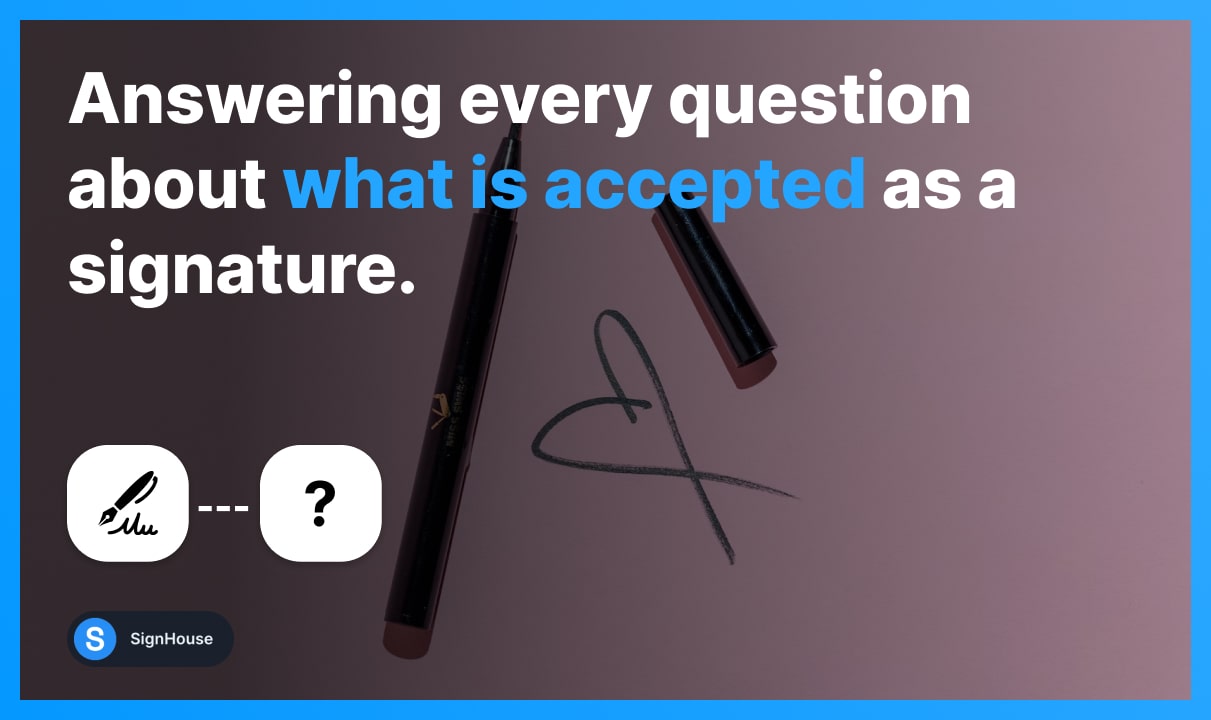Can Your Signature Be Anything? – Answered, 2024

You’re on this page because you’re wondering: Can signatures be whatever?
- Yes, your signature can be whatever…
- This goes for both wet and electronic signatures.
This guide clears out any concerns.
Can your Signature be Anything?
The answer is: Yes, your signature can be anything you want it to be. From names to drawings, numbers and symbols, everything is accepted.
- Uniqueness: Signatures aim to represent you and can be as unique as you desire.
- No Rules: There are no strict rules when creating your signature, whether it’s electronic or physical.
- Personal Preference: Your signature can take any form you wish.
- Common Approach: Many people opt for a signature that resembles their full name, especially if they don’t have a cursive signature or personal symbol.

Pro Tip: Your signature doesn’t have to be written in cursive. Of course, you can make it cursive, but know that it isn’t mandatory.
List: What Qualifies as a Signature
A signature qualifies as any mark or symbol made by a person with the intention of authenticating a document, such as a handwritten name, initials, or electronic symbol.
Of course, there’s more to it — so let’s explore it together!
1. Nickname for Signature
Since your signature doesn’t have to your full real name, feel free to use a nickname for your signature.
However: Make sure the nickname doesn’t impersonate anybody.
As long as you’re comfortable with representing your identity on a document using your nickname, you’re 100% free to do it.
2. Name / First Name
“Can I use my first name as my signature?”
Yes, you can sign a document only using your first, last, or full name. It is 100% legally binding.
Alternatively, you can sign documents only using your last name. Both options work very well.
3. Initials
“Can Initials be your Signature?”
Yes, you can use just your initials as a signature — they are legally binding and accepted as a signature.
It’s not compulsory, though. You can also write your full name as a signature, or simply choose anything else.
4. Symbols
“Can I use symbols as a signature?”
Yes. Your signature can be a symbol that you wish to represent your name and identify when signing a document.
You’ll sometimes see people signing documents with all sorts of symbols next to their names. Pick whatever represents you best!

In fact, this question brings us to another interesting one…
5. Smiley Faces
“Can your signature be a smiley face?”
You can use a smiley face as your signature. It is still legally binding, although you may want to select something more representative of your name.
- If you want to have a smiley face as your signature, we suggest that you write your name as a signature add a smiley face at the end of it.
- No popular figure has a smiley face as their whole signature.
Pro Tip: Check our archive of popular signatures inspiration from popular figures if you need some help in making your signature.
6. Hearts
“Are hearts allowed in signatures?”
Yes, you can add a heart next to your signature. It will be considered a part of your signature, and it will still be 100% legally binding.
- Any symbol is welcome next to your signature.
- Nobody can tell you that your signature is invalid because you have a heart next to your handwritten signature.
In reality: The heart symbol is still part of your legal signature that represents your personality on a document.
7. Drawings
“Can your signature be a drawing?”
Yes, your signature can be a drawing or include drawings next to your handwriting.
- Anything is accepted as a signature, including drawings.
- You can draw your name, a symbol, or draw your signature in cursive.
With SignHouse, you can draw electronic signatures and get documents signed way faster on any of their devices: phones, tablets, computers, laptops etc.
List: What’s not Allowed in a Signature
Offensive language, inappropriate imagery, or anything that could be construed as fraudulent or misleading is forbidden in signatures.
Here’s what is forbidden in signatures (and eSignatures):
- False information
- Obscenities
- Coercive language
- Fraudulent statements
- Misleading content
- Inappropriate imagery or symbols
- Unauthorized additions or alterations
- Anything that compromises the document’s legality

Pro Tip: Avoid having an illegible signature, like Donald Trump’s. While you can somewhat read his signature, it is a tough one.
Another good, legible signature example is Bill Gates’ signature. It has personality, as it is a handwritten signature with Gates’ handwriting, and the name is 100% clear too.
The conclusion
There’s really no limit of what can be your signature — we highly suggest that you keep your signature somewhat formal, legible, and representative of your personality to remain professional.
That’s all you need to know about what is accepted as a signature.
FAQs
Can a signature be typed?
Your signature 100% works and is 100% legal if it's typed, if you're using an electronic signature software!
Why? It's validity is given by other factors:
- As per the eSignature (2000) and UETA (2000) Acts passed by the US Government, alongside other requirements (explained in-depth by us here), one of them is this: “Attribution. The signature has to be uniquely identified to the signee and only linked to them”
- Using an electronic signature software such as SignHouse automatically handles that, as such apps easily attribute signatures with identifiable details (e.g. account information, location, IP, etc)
- Another requirement for a digital signature to be valid: “Retention. The documents must be stored for future reference, available to be viewed, reviewed, edited, etc. by both parties”
- SignHouse takes care of this aspect as well.
Therefore, typing your signature makes it valid, due to the aspects that an eSignature software handles for you.
Can a signature be your initials?
Yes, it absolutely could be! Why: your electronic signature is not defined by how it looks. It could even be a glyph.
Your signature's validity is given by other aspects, as explained in this article of ours:
- As per the eSignature (2000) and UETA (2000) Acts passed by the US Government, alongside other requirements (explained in-depth by us here), one of them is this: “Attribution. The signature has to be uniquely identified to the signee and only linked to them”
- Using an electronic signature software such as SignHouse automatically handles that, as such apps easily attribute signatures with identifiable details (e.g. account information, location, IP, etc)
- Another requirement for a digital signature to be valid: “Retention. The documents must be stored for future reference, available to be viewed, reviewed, edited, etc. by both parties”
- SignHouse takes care of this aspect as well.
So yes, your signature can be your initials!
Can I sign with a signature that’s not cursive?
Signing with a non-cursive signature is ok! If we're talking about digital documents, the signature will be validated by identifiable details that are separate from how it looks — that is taken care of by an eSignature software such as SignHouse.
If we're talking about physical documents:
- You could sign with a signature that's not in cursive
- You'll likely not want to do that, as it could be replicated.
- Our advice, however, is to stick to digital signatures!
Does a signature have to be your full name?
That could be the case too. Remember: your signature's validity is given by the following:
- As per the eSignature (2000) and UETA (2000) Acts passed by the US Government, alongside other requirements (explained in-depth by us here), one of them is this: “Attribution. The signature has to be uniquely identified to the signee and only linked to them”
- Using an electronic signature software such as SignHouse automatically handles that, as such apps easily attribute signatures with identifiable details (e.g. account information, location, IP, etc)
- Another requirement for a digital signature to be valid: “Retention. The documents must be stored for future reference, available to be viewed, reviewed, edited, etc. by both parties”
- SignHouse takes care of this aspect as well.
So whether your signature is your full name or not, it just has to be validated through an eSignature software. That's why, for instance, signatures created through Apple Notes, through your iPhone, are not legally recognized.
Feel free to read the full analysis of why your full name is not 100% required in a signature in this article.








